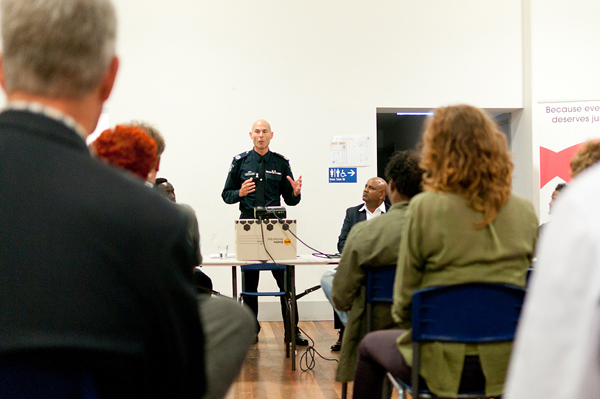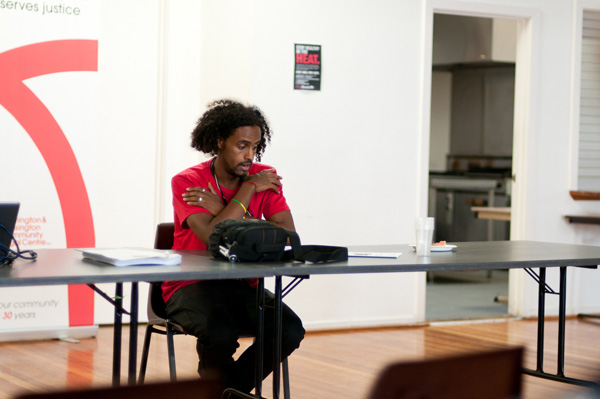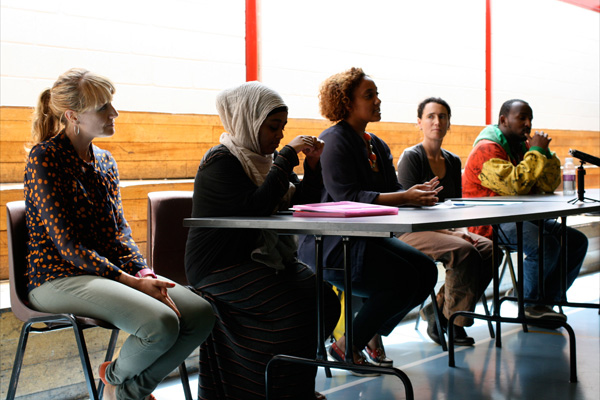On racial profiling, hard-won police reforms, and why the Age was so wrong about the riots.
IT was mid-2013, and I was about to sit in on a multicultural training session for new Victoria Police recruits. I was writing a feature for The Age about racial profiling. It had taken me several months of asking and some good fortune to get inside the academy, which is located in an old seminary on top of Wheelers Hill.
As I waited in the foyer, I peered at the old Catholic church, just beyond reception. They call it an interfaith chapel, but it still bears a large cross and the Latin motto, Christus Altare Nostrum (“Christ Our Altar”). My handler arrived and we walked past the parade grounds, where I saw a recruit stage a mock arrest of a man in a beanie.
Back then, the multicultural training comprised just a few hours out of the whole 33-week course. The sessions were scheduled in the first week, while the overwhelmed trainees were barely managing to keep their shirts buttoned in accordance with pseudo-military requirements.

Deputy Commissioner Andrew Crisp speaks at a forum on racial profiling in Footscray. Image: Aaron Claringbold
So, early on the third morning, the recruits hustled into a classroom, red-faced from a fitness test. The hour-long session was called “Multicultural Communities and Policing” and the facilitator began with facts and figures, followed by a useful discussion of the difference between migrants and refugees. Then, a liaison officer who’d arrived in Australia as a refugee told the recruits a harrowing story of state persecution in his homeland, and warned them that he didn’t trust police when he arrived here.
For the brief time remaining, the recruits responded to scenario cards. In the first scenario, an international student was robbed and assaulted on a train, but refused to cooperate with officers. He backed away, arguing that the police never helped people like him anyway.
In the second, a driver turned left without indicating. When he was pulled over, the man became very agitated, and accused the officer of targeting him because he was from Afghanistan. What to do?
“Don’t engage in that discussion,” the trainer explained. “We’re the Victoria Police. We don’t do that.” The only reason he was pulled over was because he failed to indicate. The trainer did not mention racial stereotyping – conscious or unconscious – or the possibility that an officer would ever stop someone unnecessarily. The trainer, an Anglo-Australian woman, did, however, play the role of the agitated Afghan driver, complete with accent for extra effect. She also warned the recruits that people who speak broken English might be faking it, to avoid fines.
Why am I telling you this?
Just for a little context. Yesterday in its print edition, the Age ran a headline likening young South Sudanese-Australian men to animals.
The headline – “Youths’ behaviour ‘like animals’” – was, in part, a quote from a waiter at Brunetti, who had been supervising the café on Saturday night when the young men came in, scattering the furniture and, reportedly, terrifying all concerned.
The Age devoted its front page, plus two double-page spreads and its editorial to the violence in the CBD, which it reported was a fight between “members of the Apex gang, who are predominantly of South Sudanese descent, and members of the Islander 23 gang”. This now appears to be incorrect.
Journalists quoted Dr Berhan Ahmed, founder of advocacy group the African Think Tank, who said he had tried to sound warnings about ‘“out of control” young refugees’. Ditto, Salvation Army major Brendan Notte, who said there is “a very deep sense of anger particularly with African youth and also Islander youth”, who “don’t want to be here” and have “often spent time in difficult refugee camps”.
Several reporters also chose to link the incident with Victoria Police’s recent efforts to reform racist policing practices. “Saturday’s violence has fuelled debate about Victoria Police’s policy on racial profiling”, they wrote, although, besides the journalists themselves, no one quoted in any of the articles seemed to make the connection.
Crime columnist John Sylvester stated that police in Flemington were “bagged for so-called racially profiling black kids”. The newspaper itself editorialised: “Victoria Police have swung too far in the direction of appeasement, especially after the force was sued over racial profiling in the Flemington and North Melbourne areas”.
After that multicultural policing session in 2013, the trainer escorted me back to reception. We walked past the parade grounds again – a smallish rectangle of asphalt, like a school yard – and the trainer explained that no one is allowed to step on the parade grounds, because they’re sacred. “What do you mean ‘sacred’?” I asked.
“I don’t know,” she replied. “There must be some kind of history to it.”
I returned to my car, pulse racing, incredulous, and noted down all I could remember, while through my open window I absorbed the shouts of recruits marching like soldiers on the nearby oval.
Earlier that year, then Chief Commissioner Ken Lay had announced historic reviews of the force’s cross-cultural training and the way officers deal with people they stop in the street, as part of the settlement of a five-year long racial discrimination lawsuit.
It was an extraordinary case, brought by a bold group of teenagers, with the help of the Flemington and Kensington Community Legal Centre, with pro bono representation by Arnold Bloch Liebler and a host of high profile barristers. The young men sued the police, arguing that they were regularly stopped around Flemington and North Melbourne for no legitimate reason, and assaulted and racially taunted. After the settlement, the case files were made public, and I trawled through them.
One of the young men, Maki Issa, estimated that police asked for his name and ID at least 100 times in the two years from 2006. One day he was stopped five times, he stated. One officer in particular would greet him by name and then insist on asking for his ID. “I was thinking: ‘Is this guy sick, or is it me who isn’t normal?’” Issa told me.
At the time, he was 15. Besides schoolwork, Issa was training hard for a high-level soccer team, and volunteering as a coach for younger kids from the flats. He’d never been charged with any crime.

Maki Issi speaks at a public forum about police reforms following the settlement of the racial discrimination case. Image: Aaron Claringbold
As I left the police academy, I wasn’t optimistic. From what I’d seen up there on Wheelers Hill, the old institution was marooned in the past, both symbolically and practically.
But I continued to follow the reforms, sometimes for The Age. Progress has been surprising and encouraging, if incomplete. Lay ordered in-depth, independent inquiries and established a new division to drive the resulting reforms. The force has conducted trials in which citizens are given receipts explaining why they’ve been stopped; overhauled its training for new recruits; and rewritten its handbook on interactions in the street. Last September, Victoria Police became the first force in Australia to explicitly ban racial profiling.
At the time, I interviewed Acting Commander Mick Hermans, who oversees part of the North West Metro division, including Flemington. He was effusive about the training he’d received, which was aimed at undercutting stereotypes. “It really opened my eyes to the concept of unconscious bias,” he said. “Where you grew up, the culture in which you developed, even watching television for 30 or 40 years, it all has an impact on you.”
Compared with what I witnessed at the old hilltop seminary in 2013, that’s like a defence of the Enlightenment.
The force has yet to extend this more sophisticated training beyond new recruits and select high-ranking officers – and that leaves 12,000 or so officers in the dark. And, regrettably, it hasn’t implemented any way of measuring or enforcing its prohibition on racial profiling. Issa and Daniel Haile-Michael, both among those who sued the police, released a report last year stating that discrimination remains an everyday reality on the street. “What’s really going to be a game changer is if there’s an independent body that investigates complaints against the police,” Haile-Michael told me.
But on the whole, police high-command are inching towards further change, prodded by the community. Indeed, after the incident on Saturday night, Deputy Commissioner Andrew Crisp is reported to have emailed police members, restating the force’s zero tolerance approach to racial profiling.
That’s what makes some parts of yesterday’s coverage by The Age all the more extraordinary.
The ban on racial profiling doesn’t prevent the police from investigating any crimes – it just prevents them from stopping people because of their skin colour, rather than reasonable cause. The ban on racial profiling is about justice and fairness, and about good policing. It is built on many years of research and activism both here and overseas. In Melbourne it has been driven by an inspiring group of young people who are demanding their right to participate fully in our society.
No journalist or editor can be unaware of the racism inherent in describing black men as animals. Neither can responsible writers be so loose as to connect vague and broad terms such as “African youth” and “refugees” with depictions of chaos and criminality. And given the column-space dedicated to racial profiling over recent years, it is incumbent on The Age to provide a more complex analysis of the reforms Victoria Police has introduced so far, and the good reasons why it has done so.
This article was first published by Overland magazine
Further reading about this racial profiling and the Victoria police:
Victoria Police officially prohibits racial profiling
The long road to change – the story of the racial discrimination case
The force of racial bias – a feature about Victoria Police, its officer training and complaints about racial profiling
Real change or just more talk – a feature about the police reforms prompted by the racial discrimination case
